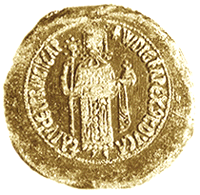...Best of Sicily presents... Best of Sicily Magazine. ... Dedicated to Sicilian art, culture, history, people, places and all things Sicilian. |
by Luigi Mendola | ||
Magazine Index Best of Sicily Arts & Culture Fashion Food & Wine History & Society About Us Travel Faqs Contact Map of Sicily |
The intrigues of bishops and nobles fostered a power struggle at court, and this certainly influenced William's attitudes. His mother was a strong figure who lived until 1183. She granted refuge to the family of Thomas Becket but also helped arrange her son's marriage to a daughter of Henry II of England, the saint's nemesis. William spent much of his youth outside Palermo, at castles such as Saint Mark of Alunzio. William reached his majority in 1171. In the meantime, the government was administered first by the royal chancellor Stephen Perche, Margaret's kinsman, and subsequently by Walter Ophamilias, a bishop of Palermo related to the Hauteville family. Matthew of Ajello, was also influential. Richard Palmer, bishop of Syracuse, may have been more cooperative. Margaret was accustomed to dissent, having survived (with her husband) such experiences as the revolt led by Matthew Bonnellis of Caccamo in 1160, resulting in the death of one of her sons. Understandably, she was very protective of William, who became fluent in several languages, including Arabic. William's first major project as king was construction of hilltop Monreale Abbey, where a mosaic shows him accepting his crown directly from Christ (in imitation of the mosaic icon in the Martorana Church showing Roger II crowned by Christ). Construction of this great church, and establishment of a diocese just a few miles from Palermo, was more than a gesture. It was meant to signal to the world that William was now a mature king willing to exercise all the power that came with the crown. His marriage, in 1177, to the young Joan of England made the exercise complete. His domestic politics and foreign policy were ambitious, but William did not enjoy military adventures himself, and rarely ventured away from western Sicily. Ibn Jubayr described him as a quasi-Muslim monarch. He directed adept negotiations with the Holy Roman Emperor, the northern Italian mercantile states, and realms in the Balkans and eastern Mediterranean, where the Sicilian forces took territory. After much conflict, he made peace with Eastern Emperor Isaac Angelus Comnenus William the Good died in 1189 with no surviving heirs. Sicily's Norman era could be said to have died with him. He is buried at Monreale. Within a few years the era of Swabia's Hohenstaufen dynasty had arrived in Sicily. Frederick II was its greatest exponent. About the Author: One of Sicily's foremost historians, Luigi Mendola is the author of two books. | |
Top of Page |
 William II, known as "William the
Good," was born in 1153 to William I "the Bad," King of
Sicily, and Margaret of Navarre. These nicknames may be misleading. They
probably reflect the rapport of each monarch with the Sicilian nobility
--never an easy lot to rule. However, in his Divine Comedy Dante placed William
II in Paradise, a rare distinction indeed. William's father, King William
I, was a son of
William II, known as "William the
Good," was born in 1153 to William I "the Bad," King of
Sicily, and Margaret of Navarre. These nicknames may be misleading. They
probably reflect the rapport of each monarch with the Sicilian nobility
--never an easy lot to rule. However, in his Divine Comedy Dante placed William
II in Paradise, a rare distinction indeed. William's father, King William
I, was a son of